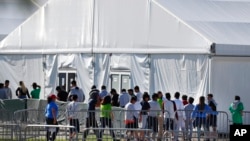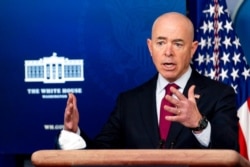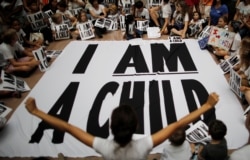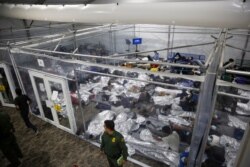The United States said Monday it will reunite the first four migrant families who were separated at the U.S. border with Mexico during Donald Trump's presidency, with the administration of President Joe Biden promising it is "just the beginning" of more reunifications.
Homeland Security Secretary Alejandro Mayorkas declined to identify the families involved in the first reunifications, set to take place this week, but said two of the four families included mothers separated from their children in late 2017, one Honduran and the other Mexican.
The Biden Cabinet official described the children, all of whom have been living in the U.S., as being 3 years old at the time of their separations and "teenagers who have had to live without their parents during their most formative years."
Parents of the children are returning to the United States on what the government is calling humanitarian parole while officials consider other longer-term options to keep the families together, according to Michelle Brane, executive director of the Biden administration's Family Reunification Task Force.
Mayorkas told reporters the government would continue "to reunite many more children with their parents in the weeks and months ahead. We have a lot of work still to do, but I am proud of the progress we have made and the reunifications that we have helped to achieve this week."
Brane said the government believes that more than 1,000 families remain separated. Officials have said many parents separated from their children, mostly from Mexico, Honduras, Guatemala and El Salvador, have been difficult to find. The exact number to be reunited depends on the outcome of negotiations with the American Civil Liberties Union to settle a federal lawsuit in San Diego, California, near the border.
The Trump administration separated more than 5,000 children at the U.S.-Mexico border from their parents as part of a get-tough effort under which any adult who entered the country illegally was prosecuted. But he ended the child-separation practice amid sharp international criticism and a June 2018 court order.
Biden assailed the family separations as a "human tragedy."
But the new U.S. leader, now in his fourth month in office, continues to block entire migrant families and single adults trying to cross the border from entering the U.S. while allowing unaccompanied children to stay, rather than expelling them as Trump did.
Biden signed an executive order on his first day in office pledging to reunite families that were still separated "to the greatest extent possible."
Biden has also ended construction of a border wall that Trump championed. While contending that the U.S. border is not open without restrictions, Biden's changed immigration policies have led to a surge of migrants that his administration has been hard-pressed to deal with, and children have been initially held in caged areas not unlike those seen during the Trump presidency.
But the crisis at the border — or "challenge" as Biden officials have often called it — has eased somewhat in recent weeks. U.S. officials have cut the average stay for unaccompanied children in Border Patrol custody to 20 hours before they are transferred to one of the 14 emergency intake centers being operated by the Department of Health and Human Services. The children then are placed in the homes of relatives already living in the U.S. or families vetted as responsible caregivers.
At the height of the migrant surge in late March, migrant children were typically being held at the border for 133 hours, far longer than the legal limit of 72 hours.
Officials say there now are 677 unaccompanied children in Border Patrol custody, down from more than 5,700 in late March. As of last week, Health and Human Services had 22,557 children in its care.
In announcing the first reunifications, Mayorkas said, "Today is just the beginning. We are reuniting the first group of families. Many more will follow. And we recognize the importance of providing these families with the stability and resources they need to heal."
The U.S. task force on the reunifications has been attempting to create a complete database of separated families, correcting inaccuracies in the files handed to them by the Trump administration and then finding the parents of the children living in the U.S.
It is also exploring the long-term legal options for the newly reunited families.







